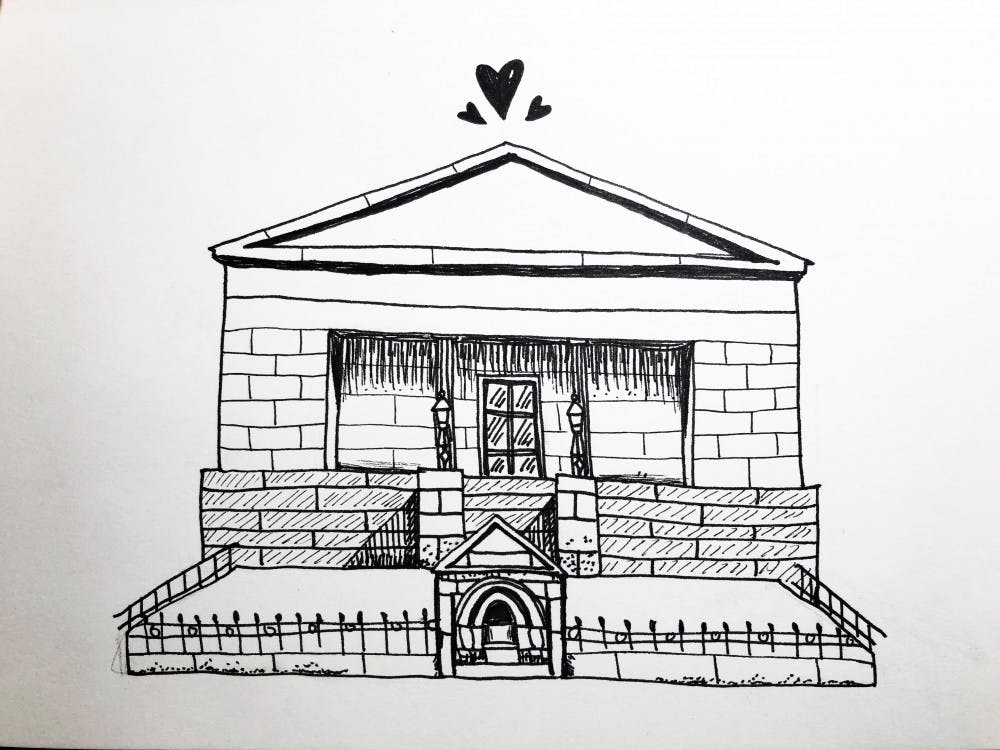One hundred and seventy-one years ago, a valentine kindled an ill-fated Providence romance between two star-crossed poets.
In 1848, Providence-based poet Sarah Helen Whitman crafted a tribute to Edgar Allan Poe for a Valentine’s Day poetry salon. Although Poe was not present at the salon, Whitman’s poem made it into his hands, said Robin Wetherill, director of membership and external relations at the Providence Athenaeum. Poe delighted in the poem, and his correspondence with Whitman commenced. “They wrote back and forth for months and eventually, Poe did come to Providence to see Whitman and court her,” Wetherill said.
Much of Poe and Whitman’s courtship was spent in the alcoves of the Athenaeum — a library and cultural center on Benefit Street. On one occasion, Whitman removed a book from a shelf in the library to show Poe an anonymous poem she admired entitled “Ulalume,” Wetherill said. Poe disclosed to Whitman that he was the unnamed poet and wrote his signature in pencil next to the poem. The book, which was a copy of the American Whig Review and still contains Poe’s signature, is one of the items in the Athenaeum’s special collections and is on display at the library’s current exhibition — “Ravenous: The Enduring Legacy of Poe.”
“Whitman and Poe shared a lot of interests,” said Kate Wodehouse, director of collections and library services at the Athenaeum. “One of the reasons Poe was interested in Whitman was really because she was his intellectual equal. They just connected on a deep level,” she said.
But their relationship was fraught with tension. Whitman’s friends made a conscious effort to steer her away from Poe, Wodehouse said. “Whitman’s mother, especially, was very against the match,” added Wetherill, and it took much persuasion for Poe to convince Whitman to accept his proposal of marriage.
Poe’s proposal to Whitman took place in a local cemetery, probably either Swan Point Cemetery or North Burial Ground, Wetherill said. Whitman finally accepted Poe’s proposal, on the condition that he stop drinking alcohol. The couple got engaged and were supposed to get married on Christmas Day.
A lock of Poe’s hair, which he presumably gave Whitman during their engagement, resides in the collections of the John Hay Library. “It was a common practice in the 19th century (to give a lock of your hair to the person you were) engaged to,” said Heather Cole, curator for literary and popular collections at the Hay. The gesture was “much more romantic than it seems,” she added.
The engagement came to an untimely end two days before Poe and Whitman were to be married. The couple were in the Athenaeum when an unknown messenger came to Whitman with a letter saying that Poe had been seen drinking the night before, Wodehouse said. Whitman broke off the engagement, and the couple never saw each other again.
Ten months later, Poe passed away.
Although Poe and Whitman’s relationship was short-lived, it made a lasting impact on Whitman, Wetherill said. “After Poe died, Whitman became a huge advocate for his work and really continued to support him,” she explained. “Later in her life, Whitman (even) dabbled in spiritualism and would try to contact Poe and would have spiritual meetings at her house,” Wetherill added. She dedicated the rest of her life to eternalizing his legacy and ensuring that his literary spirit lived on.
“We loved with a love that was more than love,” wrote Poe, in “Annabel Lee,” a poem Whitman believed was written for her.





